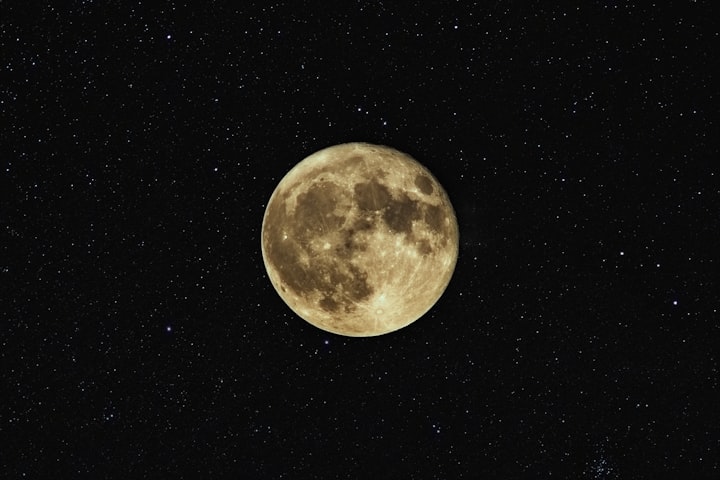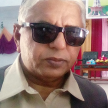Tonight, the first star I see
Short Story

Tonight, the first star I see
Dr. Tomas Streyer surveyed his group of engineers and scientists in the control room. Despite his excitement and fear, he attempted to appear composed. They may begin learning something incredible in a matter of minutes: the origins of the universe.
He attempted to take calm, deep breaths as he gazed out the window at the gorgeous blue summer sky.
"All set," he declared. When he pushed the first button, the intricate machinery and computers came to life.
"Set," he declared. He activated the massive particle accelerator beneath Switzerland's fields and cities by pressing the second button.
Proceed, he declared. And he pushed the last button at precisely twelve o'clock.
He briefly thought he was blind since everything turned pitch-black. Shocked, Tomas yelled, but the lights had already come back on. That was not his intention. He was clueless about what had just transpired.
"Everyone, please verify the systems!" he said. However, they appeared to be in perfect health. The accelerator of particles was operating flawlessly.
"Tomas," his helper uttered. "Look outside." She sounded terrified.
Five minutes later, the picture-perfect summer day was gone. Rather, the sky was as black as the deepest night. It wasn't the worst thing, though. Not only was the sun gone, but so were the moon and stars.
Screaming and shouting were heard. They were terrified that their family had also vanished, so they began phoning them. Tomas tried to breathe slowly while counting to 10 even though he felt like it was difficult to breathe. He began reading the data and figures from his experiment as he sat at the main computer. However, he was unable to identify any explanation for the events. Together with the other members of his squad, he dashed out of the building.
The other occupants of the building were outside, looking bewildered and scared. To improve their vision, they were utilizing the screens and lights on their smartphones. Numerous folks entered their vehicles and switched on their lights. To create a little area of light where everyone might stand together, they drove to the entryway. Even with the street lights on, the majority of individuals remained terrified.
Then the sun appeared in the sky once more, about twenty minutes after Tomas had turned on the particle accelerator. Once again, the black sky turned blue, and it was warm and yellow. Tomas felt as though his breathing was normal again as everyone began to laugh and dance.
However, nobody felt joyful when the actual night arrived, hours later. For even though the moon rose once more, the sky was completely devoid of stars.
..
Nobody was interested in learning the true purpose of Tomas's labor. What purpose the particle accelerator served was irrelevant to them. Did that really matter? What had transpired after he turned the machine on was all that mattered to them. The media claimed that he had taken all the stars. And they accused him of stealing the stars when they brought him before the International Criminal Court.
"I'm not guilty," declared Tomas.
"Well, Dr. Streyer, if you didn't steal the stars, what did you do?" said the prosecution's attorney.
"If you are inquiring about my work, we did not undertake any tasks," Tomas replied. All we demonstrated was that the machine was operational.
"Does removing the stars from the sky seem insignificant to you?" The attorney surveyed the courtroom's attendees. "It wouldn't seem insignificant to anyone here." No one on the planet would believe it to be unimportant.
"That was not my intention," Tomas clarified. "However, I can assure you that the test room was suddenly devoid of photons when the machine started."
"What?" phonons? This is not a group of scientists! Say it in plain English, Dr. Streyer!
Light, Tomas said. It appeared as though there was no light in our laboratory for a brief instant. We then noticed that it was night outside. up until the illumination
Standard, Dr. Streyer? The attorney consulted his notes. "It wasn't normal when the sun disappeared for precisely sixteen minutes and forty seconds." We may say that the remainder of the day was typical. However, the night hasn't returned to normal since then, has it?
Tomas had a dejected expression. "I understand." However, you have to trust me. Nothing I did could have removed the stars from the sky!
The attorney asked, "So are you saying you didn't steal the stars from us?"
Tomas answered, "No, I didn't steal them."
"You've just made it impossible for us to see them."
There was a long wait before Tomas spoke. Yes, he replied.
"What makes that any different?" the attorney questioned.
Tomas had no response to provide, one that would make sense to anyone anyhow. And they wouldn't trust him even if they understood. Years would pass before he could prove his theory.
Rather, he had a change of heart and admitted his wrongdoing.
The world may now lay blame at the feet of someone for its lost. But putting Tomas in jail for an extended period of time was pointless. Nothing would change as a result. Rather, they created a specific penalty just for him.
Tomas was deployed to work at Paranal, Chile, at the Extremely Large Telescope. The telescope was no longer in use by anyone. No travelers arrived at these lofty peaks to witness the periphery of our galaxy. No scientist requested funding to investigate the empty sky. The moon stood alone in the night sky, with only a few planets visible. Looks up were frowned upon.
Tomas felt that his punishment was appropriate. And because he worked alone, the job was nearly identical to prison.
A few years went by, and nobody seemed to remember him. Or, at any rate, everyone chose to ignore him. He watched the sun set every evening. Eight minutes and twenty seconds after the red object truly passed behind the Earth, it vanished. The fact that the laws of physics didn't change made Tomas nearly joyful. The speed of light continued to be the same as it had always been. It meant, hopefully, that he hadn't altered the cosmos all that much. He reasoned that since light is known to travel at a certain speed, maybe the dark moves at the same pace.
Naturally, there was no way to validate his theory. Not quite yet. And with no one to discuss his idea with when he was alone in the mountains, Tomas
Tomas kept his eyes on the night sky up in the Chilean highlands. Even though there was nothing to see, he spent every night staring at the same spot in the empty sky through the massive telescope. Every day at dusk, he would remember the song his parents used to sing to him:
Stars shining, stars sparkling,
Tonight, the first star I see is
I hope I could, I hope I could
Grant me my wish for tonight.
The sky remained the same for 1,596 dark nights, or almost four and a half years. However, that was alright. It did not prove his theory incorrect. Tomas considered the gloom he had brought forth. It reminded him of a wave that had gone beyond the sun. Perhaps it was moving onward now, toward the stars and the edge of our galaxy. The closest star would take 1,596 nights to pass. The light from the star would not return to Earth for 1,596 nights. Naturally, if the wave was real. if his theories were accurate. If he was mistaken, the stars would truly disappear forever.
After nearly nine years from that awful day, Tomas peered up through his telescope one night, 1,596 nights later. From the night sky, he saw Alpha Centauri flashing back at him.
the initial star.
His eyes welled with tears, and he wished. He also pictured millions of other people wishing for the same things.
Tonight, the first star I see
About the Creator
Abdul Qayyum
I am retired professor of English Language. I am fond of writing articles and short stories . I also wrote books on amazon kdp. My first Language is Urdu and I tried my best to teach my students english language ,
Reader insights
Nice work
Very well written. Keep up the good work!
Top insights
Easy to read and follow
Well-structured & engaging content
Excellent storytelling
Original narrative & well developed characters
Heartfelt and relatable
The story invoked strong personal emotions






Comments (2)
Wonderful story! I'm not a science-y person, so I had no idea that the observatory at Paranal was a real thing!
This was well crafted and could pass for a movie with Tomas as the lead actor. Great work!